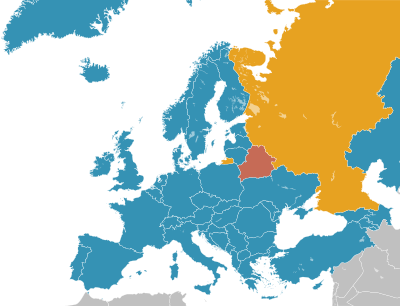Capital punishment in the Czech Republic

Capital punishment (trest smrti in Czech) is forbidden by the Charter of Fundamental Rights and Freedoms of the Czech Republic (part of the constitutional law of the Czech Republic) and is simultaneously prohibited by international legal obligations arising from the Czech Republic's membership of both the Council of Europe and the European Union.
Historically, capital punishment was legal, and was used, when the Czech Republic was part of Czechoslovakia, until the punishment was abolished by amendment of the federal criminal code in 1990. The last execution was carried out in 1989.
History and methods of capital punishment
Capital punishment was common under the
The common method of execution during the entire period was
First Czechoslovak Republic (1918–1938)
During the presidency of
German occupation (1939–1945)
During the time of the
In the period of German occupation, only 3 criminals were sentenced to death and executed by Czech courts.[2]
Postwar retribution (1945–1948)
After World War II, based on the
Communist Czechoslovakia (1948-1989)
During the presidency of
During this period hundreds of other people died due to cruel conditions in prisons and concentration camps such as the uranium mine in Jáchymov.
During the presidency of Antonín Zápotocký (1953–57) 94 people were executed. That figure fell to 87 people during Antonín Novotný's presidency (1957–68), 14 people during the presidency of Ludvík Svoboda (1968–75, including a period during which Prime Minister Lubomír Štrougal acted as President in ill Svoboda's absence) and then to 38 people during that of Gustáv Husák (1975–89).[2]
From 1954 to 1968 all executions were carried out in Pankrác Prison, Prague; after 1968 some took place in Bratislava. In 1956 the number of crimes punishable by death was reduced and mandatory review of sentences was introduced. In 1961 a law made the conditions for capital punishment more strict, with only especially brutal murders punishable by death.
The last execution in Czechoslovakia took place on 8 June 1989, when Štefan Svitek was hanged in Bratislava prison for triple murder; in today's Czech Republic the last executed person was Vladimír Lulek, hanged on 2 February 1989 in Pankrác Prison for murder of his wife and four children. The last person sentenced to death was Zdeněk Vocásek, but his sentence was changed to life imprisonment in 1990.
Abolition of capital punishment
Soon after the Communist party fell from power in 1989 the new president Václav Havel pushed the abolition of capital punishment through parliament. A May 1990 criminal law reform replaced capital punishment with life imprisonment. Furthermore, in January 1991 capital punishment became prohibited by the Charter of Fundamental Rights and Freedoms, which became part of the Czechoslovak constitutional law and since the dissolution of Czechoslovakia remains part of the Czech constitutional law. The practice became further prohibited when the Czech Republic joined the Council of Europe in 1993 and the European Union in 2004.
Public opinion
A 2008 poll found that over 60 percent of those questioned said they thought the death penalty should be reintroduced.[5] In 2007 it was 58%.[6] However, a 2019 poll shows that support for the death penalty is declining, with 50 percent of Czechs saying they would like the death penalty to be reintroduced, while 41 percent were against the reintroduction.[7]
References
- Slovak State. The period of occupation also introduced many other methods of execution (apart from hanging and firing squad) such as guillotine, lethal injection and gas chamber. See Liška, Otakar; a kolektiv (2006). Tresty smrti vykonané v Československu v letech 1918–1989. Praha: Úřad dokumentace a vyšetřování zločinů komunismu. pp. 261–262.
- ^ ISBN 80-86621-09-X.
- ISSN 1213-8991. Retrieved 12 April 2017.
- ^ Šír, Vojtěch (10 March 2010). "Popraviště v protektorátu Čechy a Morava". Fronta.cz (in Czech). Retrieved 12 April 2017.
- ^ "Poll: Two-thirds of Czechs for the reintroduction of the death penalty". 12 June 2008.
- ^ "Most Czechs support death penalty, poll suggests". 11 June 2007.
- ^ "The Visegrad Group: The Czech Republic, Hungary, Poland and Slovakia | Support for death penalty at all-time low in Czech Republic - survey". 18 June 2019.
External links
- List of all people executed in Czechoslovakia, historical background, laws, bibliography (in Czech, MS Word document, HTML versionby Google)
